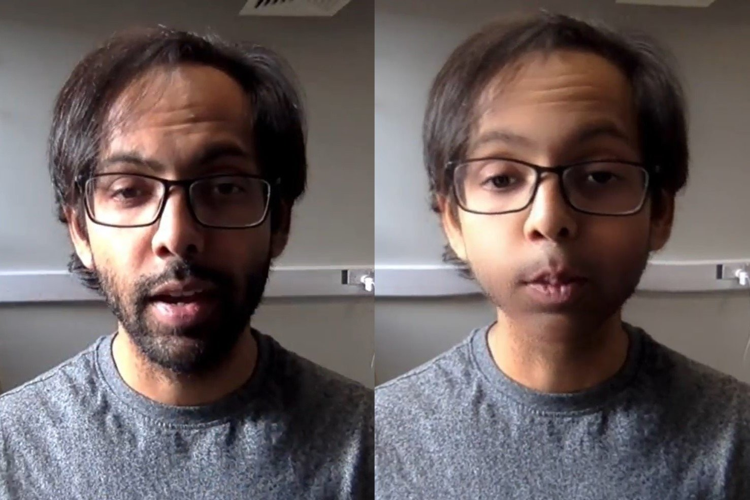
(Anglia Ruskin University via SWNS)
By Stephen Beech
A high-tech illusion that allows adults to see themselves as children can unlock long-forgotten memories.
Researchers discovered that briefly altering how people perceive their own body can help them recall the distant past – potentially even those from the earliest stages of childhood.
The study, led by neuroscientists at Anglia Ruskin University (ARU) in Cambridge, is the first to show that adults can better access their early memories after embodying a childlike version of their own face.
Fifty adults participated in an “effacement illusion” which allows people to experience a face they see on a computer screen as their own, as though looking in a mirror.
The participants viewed a live video of their own face, digitally altered using an image filter, to resemble how they might have looked as children.
As they moved their heads, the face on screen mirrored their movements, creating a strong sense that the childlike face was their own. A control group viewed their unaltered adult faces under the same conditions.
After the illusion, participants completed an autobiographical memory interview, recalling events from both their childhood and the previous 12months.
The research team recorded and quantified the amount of detail that participants provided when recalling their "episodic autobiographical memories" - memories that enable people to mentally relive previous experiences and mentally “time travel” back to events from their own past.
The study, published in the journal Scientific Reports, is the first to show that access to remote memories can be affected by changes to the bodily self.
The researchers found that participants who viewed the childlike version of their face recalled "significantly more" episodic childhood memories than those who saw their adult face.
The team believes their findings offer new insights into how bodily self-perception interacts with memory and could even pave the way for new techniques to unlock previously inaccessible memories, including those from the “childhood amnesia” phase, which is typically before the age of three.
Lead author Dr. Utkarsh Gupta, who conducted the study as part of his PhD at ARU, said: “All the events that we remember are not just experiences of the external world, but are also experiences of our body, which is always present.

Growtika
“We discovered that temporary changes to the bodily self, specifically, embodying a childlike version of one’s own face, can significantly enhance access to childhood memories.
"This might be because the brain encodes bodily information as part of the details of an event."
Dr. Gupta, now a cognitive neuroscience research fellow at the University of North Dakota in the United States, added: "Reintroducing similar bodily cues may help us retrieve those memories, even decades later.”
Senior author Professor Jane Aspell, of ARU, said: “When our childhood memories were formed, we had a different body.
"So we wondered: if we could help people experience aspects of that body again, could we help them recall their memories from that time?
“Our findings suggest that the bodily self and autobiographical memory are linked, as temporary changes to bodily experience can facilitate access to remote autobiographical memories."
She added: “These results are really exciting and suggest that further, more sophisticated body illusions could be used to unlock memories from different stages of our lives – perhaps even from early infancy.
"In the future it may even be possible to adapt the illusion to create interventions that might aid memory recall in people with memory impairments.”






















(0) comments
Welcome to the discussion.
Log In
Keep it Clean. Please avoid obscene, vulgar, lewd, racist or sexually-oriented language.
PLEASE TURN OFF YOUR CAPS LOCK.
Don't Threaten. Threats of harming another person will not be tolerated.
Be Truthful. Don't knowingly lie about anyone or anything.
Be Nice. No racism, sexism or any sort of -ism that is degrading to another person.
Be Proactive. Use the 'Report' link on each comment to let us know of abusive posts.
Share with Us. We'd love to hear eyewitness accounts, the history behind an article.